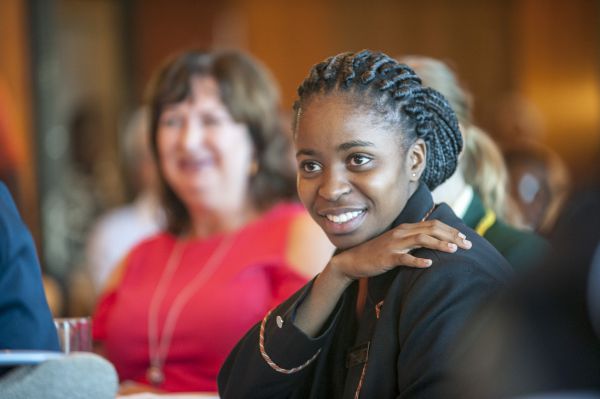Class of 2017: The top 25 matric pupils
Mphoentle Piliso (17) worked at a local spaza shop during the school holidays and earned R300, which she used to buy the textbooks she was not issued with at school.
Her grandmother, a pensioner, raised her after her mother died when Mphoentle was three, and borrowed money from neighbours to pay for Mphoentle’s boarding fees and other needs. Her old-age social grant was not enough to provide for Mphoentle and the rest of her big family.
Then, in June last year, Mphoentle was diagnosed with asthma.
“I was shocked and hurt, and I could not cope. I had to adapt to taking medication and it was not easy. I could not concentrate on my studies, but I managed to be well again because I knew it was not going to stand in my way of succeeding,” she said.
Mphoentle is one of the top matric pupils in the country. On Thursday, the Cofimvaba Senior Secondary School pupil from the Eastern Cape was among the 25 top matric pupils honoured by Basic Education Minister Angie Motshekga at a breakfast in Sandton, Johannesburg. The breakfast is held every year before the announcement of the matric results in the evening.
“I have always wished to be here. So I can say, yes, I expected it. I worked hard during my exams and they were quite easy. I had to wake up at 3am every day from the beginning of the year to study. The preliminary exams showed me flames so I had to make sure that I upped my game,” Mphoentle said.
She is going to study medicine at the University of Cape Town and hopes to build her grandmother a big house one day to thank her for all the sacrifices she made.
Addressing the top pupils and their parents at the breakfast, Motshekga said they were the “top dogs of the class of 2017”.
“You are the best that we have. We want to say ‘well done’ to you and your parents because you are the best that South Africa has produced. You are the real crème de la crème of our education system, not of your school, not of your province, not of your district, but of the country,” she said.
Motshekga said the pupils did not perform any magic; it was hard work that had put them where they are.
Speaking to the Mail & Guardian, Motshekga said she was happy with the results, particularly because the system was starting to stabilise following “very scary decisions we took”, such as raising the “cognitive demands” of the question papers by making the questions more challenging.

“What is good is that some of the difficult decisions of raising the cognitive demands of the question papers very high paid off. The [quality assurer] Umalusi report tells us that most of the papers that we presented to them, they accepted the standards as they were, they accepted our raw marks, and for me it’s a sign of a system that is beginning to stabilise,” she said.
Raw marks are unaltered scores that are sent by the department to Umalusi. It was announced in December that, of the 58 subjects that were written, the raw marks of 38 were accepted; these included subjects such as mathematics and physical science. The marks of 16 subjects were adjusted upwards, among them accounting and geography, and four were adjusted downwards — history, tourism, isiXhosa first language and Afrikaans first language.
Motshekga said, although she had hoped that by the time she left the ministry there would be a matric pass rate of 80%, she was encouraged that there were provinces that were performing at that level.
“That is impressive for a big system like ours,” she said.
A total of 802 636 pupils sat for matric exams last year.
Motshekga said what was especially heartening about the exams was that about 900 pupils who had mental disabilities managed to achieve bachelor passes.
“And that is what makes me happy about our system is that it caters for learners with severe mental illnesses, the poorest of the poor to the richest, and gives them a chance to succeed.”
But the results also showed that a lot of effort had to be put into early childhood development to prepare pupils to excel in the senior phase, she said.
